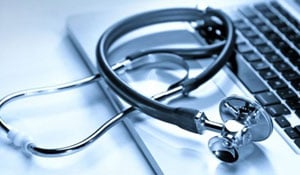Share this
Backup Solutions for Healthcare: What to Look For
by Bridget.Giacinto on Feb 9, 2024 8:30:00 AM
 In the healthcare industry, special attention needs to be paid to the security and protection of patients’ private and highly sensitive electronic medical records. Healthcare providers are held to a higher standard regarding the backup, encryption, and retention of electronic medical records. These regulations were implemented to protect the confidentiality of patients who put their trust into their doctors’ hands. This trust in the doctor-patient relationship is of paramount importance, and any breach of that confidentiality is simply unacceptable. As a result, there are strict data protection standards that were put in place to ensure the privacy and security of patient data.
In the healthcare industry, special attention needs to be paid to the security and protection of patients’ private and highly sensitive electronic medical records. Healthcare providers are held to a higher standard regarding the backup, encryption, and retention of electronic medical records. These regulations were implemented to protect the confidentiality of patients who put their trust into their doctors’ hands. This trust in the doctor-patient relationship is of paramount importance, and any breach of that confidentiality is simply unacceptable. As a result, there are strict data protection standards that were put in place to ensure the privacy and security of patient data.
The Beginnings of HIPAA
In 1996, HIPAA (Health Insurance Portability and Accountability Act) was enacted by the United States Congress and later provisioned to establish national standards for the security and privacy of patients’ data. This legislation and the updates that followed called for healthcare professionals to take the necessary actions to ensure that electronic protected health information (ePHI) was kept private and secure in full compliance with HIPAA regulations.
 As a result, medical and dental healthcare providers must stay abreast of these ever-changing requirements for data protection. Noncompliance is not an option, as the penalties are substantial and carry stiff fines. For many small practices, this can be a daunting task, especially if they do not have fully-informed personnel dedicated to establishing proper policies and procedures or the IT staff to ensure that backups and retention settings are properly set up in compliance with regulatory requirements.
As a result, medical and dental healthcare providers must stay abreast of these ever-changing requirements for data protection. Noncompliance is not an option, as the penalties are substantial and carry stiff fines. For many small practices, this can be a daunting task, especially if they do not have fully-informed personnel dedicated to establishing proper policies and procedures or the IT staff to ensure that backups and retention settings are properly set up in compliance with regulatory requirements.
This opens up a huge opportunity for specialized medical and dental-focused resellers and backup software providers who are willing to provide their data protection expertise and knowledge of HIPAA requirements to assist these offices with their data protection, security, and retention needs.
Top 9 Things to Look for in
Backup Solutions for Healthcare
If you would like to work directly with a backup solutions provider, here are a few things that you want to look for in a backup solution for healthcare.
- HIPAA Compliance
Backup, encryption, data retention, and recovery requirements are the backbone of HIPAA compliance. Look for a solution that offers HIPAA-compliant data protection by securely backing up, encrypting, retaining, and restoring data without compromising patient privacy. - Secure Data Protection for Backups With 256-bit Encryption
To ensure that backups of your files and systems are protected from unauthorized access, they should be encrypted both on the backup media and in transit, ideally with one of the highest encryption standards, such as 256-bit AES encryption. - Ability to Restore to Dissimilar Hardware in the Event of a Disaster
If your PC or server fails, you need to be able to restore your entire system, including applications, operating system, and settings, to another piece of hardware so you can get back to helping your patients quickly. To speed up this process, you should also be able to mount your system as a virtual machine. This will save you long boot times in an emergency. - Flexible Data Retention to Meet Regulatory Demands
The best practice for data retention for ePHI is 7 years, although HIPAA only requires 6 years according to LMN Matters (cms.gov). You want to have a solution that offers flexible data retention so you can decide exactly what you need to keep and for how long - and that on a per-file basis. - Easy, User-Friendly Data Recovery
Your backup is only as good as its ability to restore your files. Your backup solution should allow you to make multiple copies so that you can recover your files and systems in the event of data loss from accidental deletion of individual files to hardware failures and natural disasters that render your office inaccessible. It's also important to regularly test the recovery of your backups so that you know how to restore your data in an emergency. - Real-time Reporting and Email Alerts to Validate Backup Job Status
You should be able to know the status of your backups no matter where you are. Make sure you have the flexibility to configure alerts and email notifications. Even better, you should be able to set alerts for each backup job, as well as a daily, weekly, or monthly summary report. - Simple Licensing Structure That Protects All Your Data
Avoid managing multiple licenses for plug-ins and add-ons. Check with the vendor to see if you can secure physical and virtual server systems and typical applications such as practice software, SQL, and Exchange with a single license and application. - Local Support With the Knowledge to Provide Technical Assistance
When you need technical support, the last thing you need is boilerplate answers from untrained overseas call center agents. Find out where your backup support team is located and find a solution with a competent local support team that understands your environment and your situation. - Installation and Backup Setup to Ensure Proper Configuration
In most small practices, if there is no IT service provider, the person who knows the most about the technology is an experienced staff member who is usually not an IT specialist. No one expects this person to know everything, especially when it comes to backup. When you find a company like NovaBACKUP to install and configure your backup solution, you can be sure that everything is installed and configured properly from day one.
For more information about NovaBACKUP for Medical Practices, click here.
If you have any questions about backing up your patient data, please contact us. We are always happy to help.
Share this
- Pre-Sales Questions (112)
- Tips and Tricks (95)
- Industry News (60)
- Reseller / MSP (37)
- Security Threats / Ransomware (29)
- Applications (28)
- Best Practices (26)
- Cloud Backup (25)
- Backup Videos (24)
- Disaster Recovery (24)
- Compliance / HIPAA (23)
- Storage Technology (21)
- Virtual Environments (17)
- Technology Updates / Releases (9)
- Infographics (8)
- Backup preparation (3)
- Company (US) (1)
- Events (1)
- Events (US) (1)
- Products (US) (1)
- March 2024 (2)
- February 2024 (2)
- January 2024 (1)
- December 2023 (1)
- November 2023 (1)
- October 2023 (1)
- September 2023 (1)
- August 2023 (1)
- July 2023 (1)
- May 2023 (1)
- March 2023 (3)
- February 2023 (2)
- January 2023 (3)
- December 2022 (1)
- November 2022 (2)
- October 2022 (2)
- September 2022 (2)
- August 2022 (2)
- July 2022 (1)
- June 2022 (1)
- April 2022 (1)
- March 2022 (2)
- February 2022 (1)
- January 2022 (1)
- December 2021 (1)
- November 2021 (1)
- September 2021 (1)
- August 2021 (1)
- July 2021 (1)
- June 2021 (2)
- May 2021 (2)
- April 2021 (1)
- March 2021 (2)
- February 2021 (1)
- January 2021 (2)
- December 2020 (1)
- November 2020 (1)
- October 2020 (2)
- September 2020 (4)
- August 2020 (2)
- July 2020 (1)
- June 2020 (1)
- May 2020 (1)
- April 2020 (1)
- March 2020 (3)
- February 2020 (2)
- January 2020 (2)
- December 2019 (1)
- November 2019 (1)
- October 2019 (1)
- August 2019 (1)
- July 2019 (1)
- June 2019 (1)
- April 2019 (1)
- February 2019 (1)
- January 2019 (1)
- December 2018 (1)
- November 2018 (2)
- August 2018 (3)
- July 2018 (4)
- June 2018 (2)
- April 2018 (2)
- March 2018 (2)
- February 2018 (2)
- January 2018 (3)
- December 2017 (1)
- September 2017 (1)
- May 2017 (2)
- April 2017 (5)
- March 2017 (4)
- February 2017 (1)
- January 2017 (1)
- December 2016 (1)
- November 2016 (1)
- October 2016 (2)
- September 2016 (1)
- August 2016 (3)
- July 2016 (2)
- June 2016 (3)
- May 2016 (7)
- April 2016 (8)
- March 2016 (1)
- February 2016 (3)
- January 2016 (12)
- December 2015 (7)
- November 2015 (6)
- October 2015 (6)
- September 2015 (2)
- August 2015 (4)
- July 2015 (2)
- June 2015 (2)
- May 2015 (1)
- April 2015 (5)
- March 2015 (3)
- February 2015 (4)
- January 2015 (2)
- October 2014 (5)
- September 2014 (8)
- August 2014 (5)
- July 2014 (8)
- June 2014 (5)
- May 2014 (5)
- April 2014 (9)
- March 2014 (7)
- February 2014 (7)
- January 2014 (5)
- December 2013 (5)
- October 2013 (7)
- September 2013 (2)
